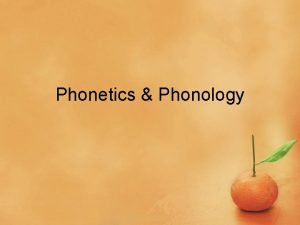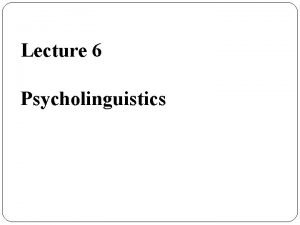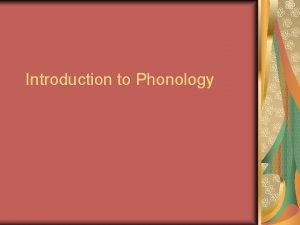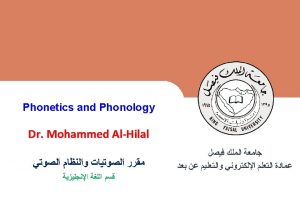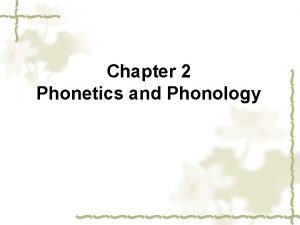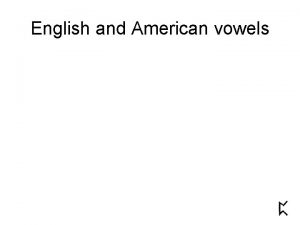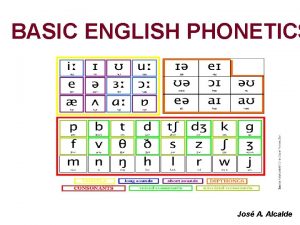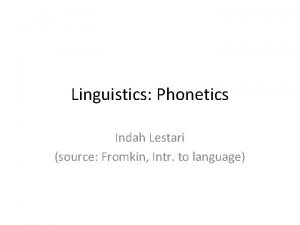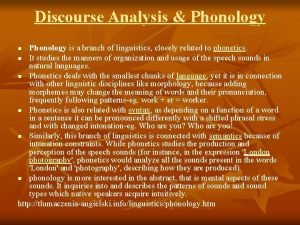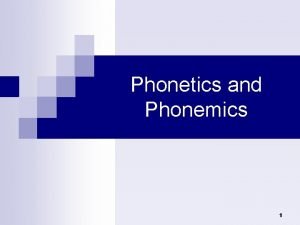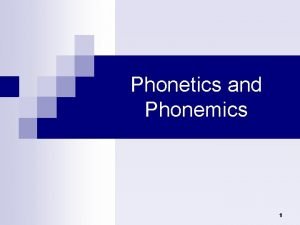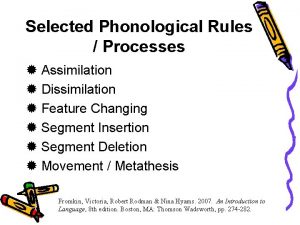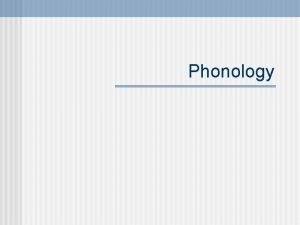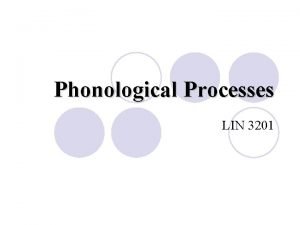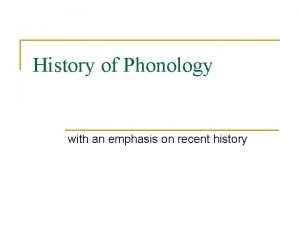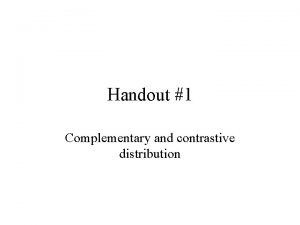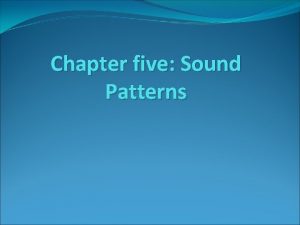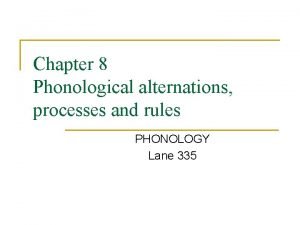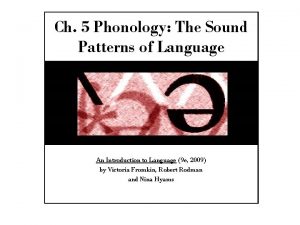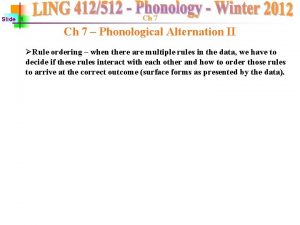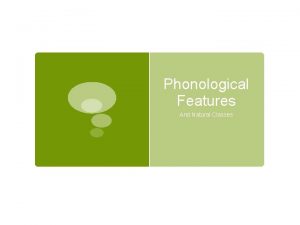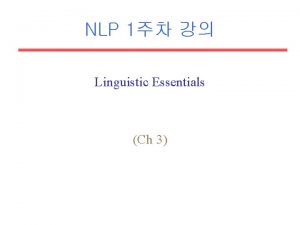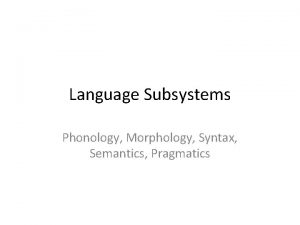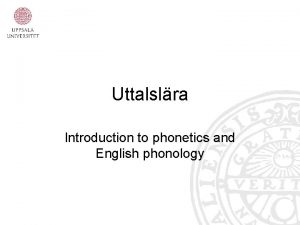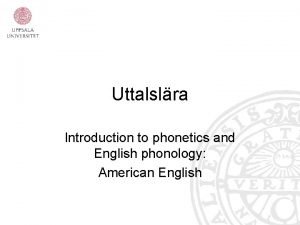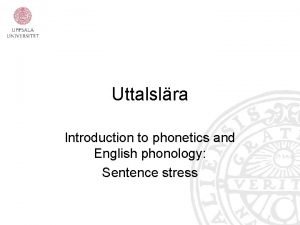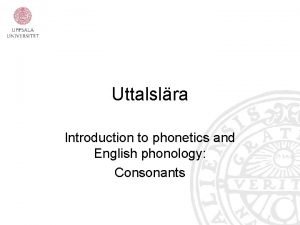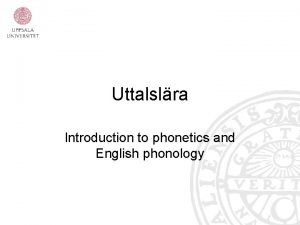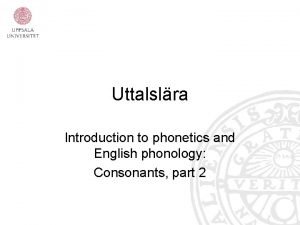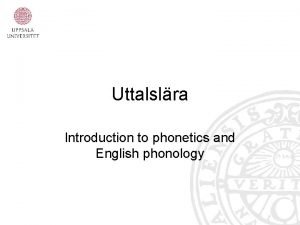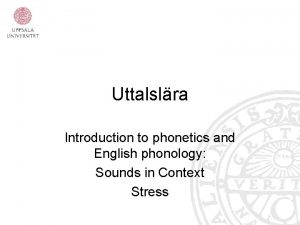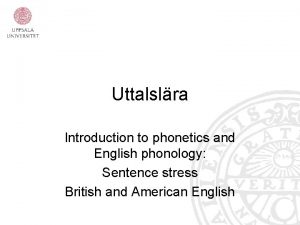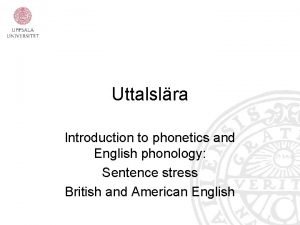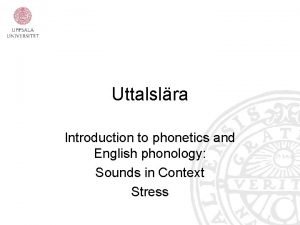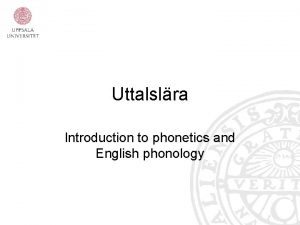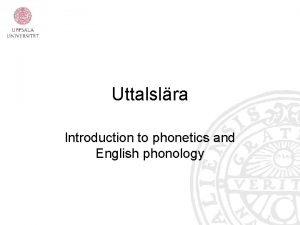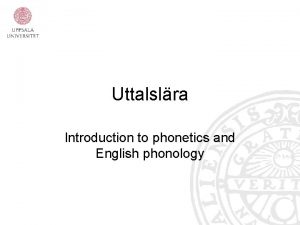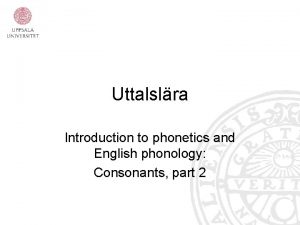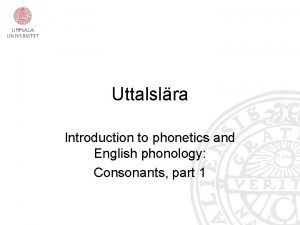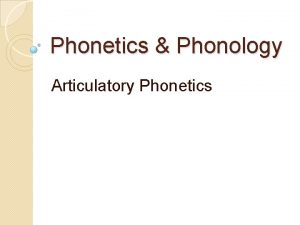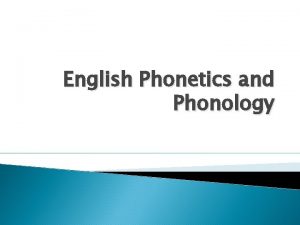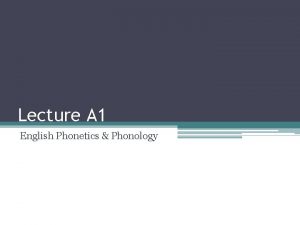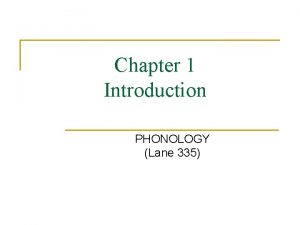Uttalslra Introduction to phonetics and English phonology Once



































- Slides: 35

Uttalslära Introduction to phonetics and English phonology

Once there was a young rat named Arthur, who could never make up his mind. Whenever his friends asked him if he would like to go out with them, he would only answer, "I don't know. " He wouldn't say "yes" or "no" either. He would always shirk making a choice. His aunt Helen said to him, "Now look here. No one is going to care for you if you carry on like this. You have no more mind than a blade of grass. "

Phonetics and phonology • Phonetics is the study of the sounds of human speech • Phonology is the study of a sound system in human language We are going to study the sounds (phonemes) that occur in the English language, and a few of the rules that govern them.

Course outline Part of the language structure course (together with grammar, translation and vocabulary) Five lectures Seminars Written exam (A 1/HS 1/T 1)

Course outline The course will focus on • Basic terminology • Transcription and the International Phonetic Alphabet • Spelling-sound differences • Contrasts between Swedish and English

Course material Introducing English Pronunciation by Rönnerdal & Johansson Study guide and exercises, in the Language Structure compendium

Variants of English Received Pronunciation (RP) “British English” General American (GA) “American English”

Spelling versus transcription Transcription is a way of writing down the sounds of the spoken language (phonemes) In English, spelling does not correspond exactly to pronunciation

Spelling versus transcription: examples Spelling Transcription pin /pın/ juice /dʒu: s/ gnat /næt/ International Phonetic Alphabet (IPA): used for transcription of all languages

Vowels A vowel is a sound that is produced with the help of the vocal cords, and without any obstruction of the oral cavity. A syllable normally has one vowel sound. English has 20 vowel sounds (but only 5 vowel letters).

Vowels: three characteristics Vowels are open or close, front or back, rounded or unrounded.


The vowel sounds of English /ı/ pit /e/ pet /æ/ pat /ʊ/ put /ʌ/ but /ə/ above /ɒ/ pot (only RP) /i: / see /3: / girl /ɑ: / father /ɔ: / door /u: / noon /eı/ face, pain /aı/ iron /ɔı/ boy /aʊ/ scout /əʊ||o(ʊ)/ boat /ıə/ hear (only RP) /eə/ bear (only RP) /ʊə/ poor (only RP, uncommon)

Monophthongs Also known as pure vowels. Only one sound (mono- = one) Monophthongs can be short or long.

Short vowels /ı/ /e/ /æ/ /ʊ/ /ʌ/ /ɒ/ pit pet pat put but pot (only RP) /ə/ above

/e/ as in bed Spellings: e, ea Examples herring /'herıŋ/ bread /bred/ said /sed/

/æ/ as in bad Spellings: a Examples sad /sæd/ cabin /'kæbın/

/e/ versus /æ/ said /sed/ bed /bed/ head /hed/ etc. . . sad /sæd/ bad /bæd/ had /hæd/

/ʊ/ as in put Spellings: u, oo, o Examples bull /bʊl/ wool /wʊl/ wolf /wʊlf/

/ʌ/ as in cut Spellings: u, o Examples but /bʌt/ none /nʌn/ front /frʌnt/

/ɒ/ (RP) as in got Spellings: a, o GA has /ɑ: / or /ɔ: / in most words where RP has /ɒ/. A difference in length (quantity) as well as sound (quality). Examples gone /gɒn || gɔ: n/ bomb /bɒm || bɑ: m/ quality /'kwɒlıtı || 'kwɑ: lıtı/

/ı/ as in sit Spellings: e, i, y Can occur in stressed or unstressed syllables Examples begin /bı'gın/ target /'tɑ: (r)gıt/ city /'sıtı/

/ə/ (schwa) Spellings: usually a, o, u ; sometimes e, i Examples above /ə'bʌv/ polite /pə'laıt/ suppose /sə'pəʊz/

/ə/ (schwa) Schwa, /ə/, is the most common vowel sound in the English language. It is used in unstressed syllables, where the vowel is reduced. Compare: suspect (verb) /səs'pekt/ suspect (noun) /'sʌspəkt/

/ə/ (schwa) This present is for my brother. It's a book about a boy wizard. To survive the cold weather, you have to make thorough preparations. Note: The letters in red are /ə/ in RP and GA. The letters in blue are /ə/ in RP and /ər/ in GA.

/ı/ in unstressed syllables In some words, /ı/ is used instead of /ə/ when a syllable is unstressed, especially when the spelling is e, i, y. /ı/ also occurs in stressed syllables, unlike /ə/. target biscuit city /'tɑ: (r)gıt/ /'bıskıt/ /'sıtı/

Long vowels /i: / see /ɜ: / girl /ɑ: / father /ɔ: / door /u: / noon

/i: / as in see Spellings: ee, ea, e, i, ie Examples free /fri: / bead /bi: d/ police /pə'li: s/

/ɜ: / as in earth Spellings: e, ea, i, u Examples heard /hɜ: (r)d/ girl /gɜ: (r)l/ lurk /lɜ: (r)k/

/ɑ: / as in dark Spellings: a Examples castle /kɑ: sl/ star /stɑ: (r)/

/ɔ: / as in door Spellings: a, au, aw, o, oa, oo, ou Examples stalk /stɔ: k || stɑ: k/ yawn /jɔ: n || jɑ: n/ sword /sɔ: (r)d/

/u: / as in cool Spellings: ew, oo, ou, u, ue Examples blue /blu: / blew /blu: / soup /su: p/ pool /pu: l/

Mute vowels occur in the spelling but not in the pronunciation or transcription of some words. The most common mute vowel is the final “e”. hate /heıt/ hurricane /ˈhʌrıkeın/

Unstressed syllables with “long” vowels athlete /ˈæθli: t/ appetite /ˈæpətaıt/ hurricane /ˈhʌrıkeın/ A mute e in the spelling often signals that the preceding unstressed vowel is not reduced to schwa or /ı/.

Thank you for listening!
 Introduction to general phonetics and phonology
Introduction to general phonetics and phonology Phonetically definition
Phonetically definition Difference between phonetics and phonology
Difference between phonetics and phonology Manner of articulation
Manner of articulation Phonetics and phonology
Phonetics and phonology Introduction to english linguistics exercises answers
Introduction to english linguistics exercises answers Difference between phonetics and phonology
Difference between phonetics and phonology Difference between phonetics and phonology
Difference between phonetics and phonology What is the difference between phonetics and phonology
What is the difference between phonetics and phonology Cardinal vowels
Cardinal vowels Phonetics and phonology
Phonetics and phonology Kæts
Kæts Phonetics vs phonology
Phonetics vs phonology Examples of juncture
Examples of juncture American english phonology
American english phonology Hijkmn pronunciation
Hijkmn pronunciation Phonetic is
Phonetic is Discourse analysis and phonology
Discourse analysis and phonology Dipping intonation
Dipping intonation Phonetics and phonemics
Phonetics and phonemics N phonetics
N phonetics Dissimilation rules
Dissimilation rules Whats an allophone
Whats an allophone Phonology process
Phonology process Non segmental phonology
Non segmental phonology Autosegmental phonology
Autosegmental phonology Natural classes of sounds
Natural classes of sounds What is complementary distribution
What is complementary distribution Distinctive features phonology
Distinctive features phonology Alpha notation phonology
Alpha notation phonology Assimilation rules in phonology
Assimilation rules in phonology Alternation in phonology
Alternation in phonology Phonological features chart
Phonological features chart Phonology examples sentences
Phonology examples sentences Linking in phonology
Linking in phonology Phonology syntax semantics pragmatics
Phonology syntax semantics pragmatics




